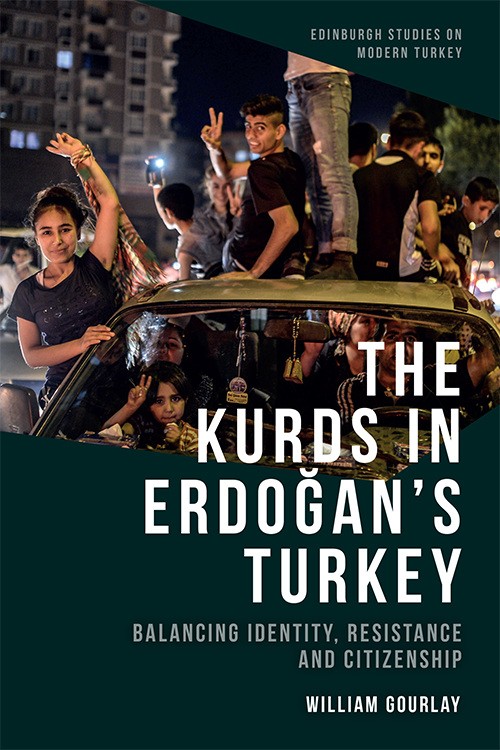Edinburgh Studies on Modern Turkey; Published July 2020
“This book examines the circumstances of the Kurds in 21st century Turkey, under the hegemony of the AKP government. After decades of denial, oppression and conflict, Kurds now assert a more confident presence in Turkey’s politics – but does increasing visibility mean a rejection of Turkey?
- Investigates Kurdish political identity under the tightening rule of the Justice and Development Party in Turkey
- Examines Kurdish identity in the Republic of Turkey and inquires whether there is room for pluralism in Turkey’s political sphere
- Incorporates data gathered in the streets, bazaars and teahouses of Istanbul and Diyarbakır, the most important Kurdish-populated cities in Turkey
- Documents Kurds’ participation in electoral politics and traditions of civilian resistance within the context of Turkey’s pursuit of liberal democracy
- Considers central elements of Kurdish identity – language, culture, and geography – and how these are contested between government and Kurdish narratives
- Provides a detailed examination of the Kurds’ struggle in Turkey at a time of rising Islamism and authoritarianism and emerging trans-national Kurdish mobilization.
Recording Kurdish voices from Istanbul and Diyarbakır, Turkey’s most important Kurdish-populated cities, this book generates new understandings of Kurdish identity and political aspirations. Highlighting elements of Kurdish identity including Newroz, the Kurdish language, connections to religion, landscape and cross-border ties, it offers a portrait of Kurdish political life in a Turkey increasingly dominated by its president, Recep Tayyip Erdoğan. Within the context of Turkey’s troubled trajectory towards democratisation, it documents Kurdish narratives of oppression and resistance, and enquires how Kurds reconcile their distinct ethnic identity and citizenship in modern Turkey.”
William Gourlay is a Teaching Associate at the School of Social Sciences, Monash University. His work has appeared in a number of key journals, including the Journal of Muslim Minority Affairs, Middle East Critique and Ethnopolitics as well as Australian press. This is his first book.
Acknowledgements
Introduction: Eruption in Diyarbakır
1. Identity, ethnicity, politics: from Kemalism to ‘New Turkey’
Conceiving Turkishness in the Republic of Turkey
Kurdishness: long suppressed nationhood, or otherwise
Countenancing diversity: re-imagining national identity
Identity and difference in flux: the Gezi Park protests
Instituting ‘Yeni Türkiye’
2. Talking to Kurds about ‘Identity’
Entering ‘the field’
An Australian in Kurdish neighbourhoods
Conceiving ‘identity’
Being different, or how to spot a Kurd in Turkey
3. Demarcating Kurdish culture
Language: ‘ana dil’ or ‘zimanê me’
Celebrating Newroz, or Nevruz
Resisting managed diversity
4. The Kurds and Islam: defying hegemony and the ‘caliphate’
Kurds & Islam
Islam in the Republic of Turkey
The AKP and Islam in the public sphere
Shifting Kurdish relationships with Islam
Kurds as ‘Others’
Contesting Islam and asserting difference
5. Contesting homeland(s): city, soil and landscape
‘Toprak’: naming, claiming and relating to the landscape
Diyarbakır: symbolic city
Alternative labels
Spatial contestations: identity and politics
6. Kurdayetî: Pan-Kurdish sentiment and solidarity
Kurdayetî: both ‘we’ and ‘us’
Crises, cross-border movement and consolidating solidarity
Kurdayetî confronts ISIS
Victory over ISIS and its aftermath
Cross-border currents
7. Oppression, solidarity, resistance
Kurds in Turkey: a History of Oppression?
Oppression Catalysing a Collective Identity
Berxwedan Jiyane: ‘Resistance is Life’
Maintaining resistance in ‘New Turkey’?
8. Kurds as citizens
Citizenship as obligation, imposition, resignation
Weight of circumstances: belonging, friends, relatives
Participating in politics: citizenship made manifest
Struggling for democracy?
Turning up – again – at the ballot box
The ‘ideal’: retaining currency?
Conclusion: reconciling ethnic identity, citizenship and the ‘ideal’ in Erdoğan’s Turkey?
Whither the Kurds?
Bibliography

